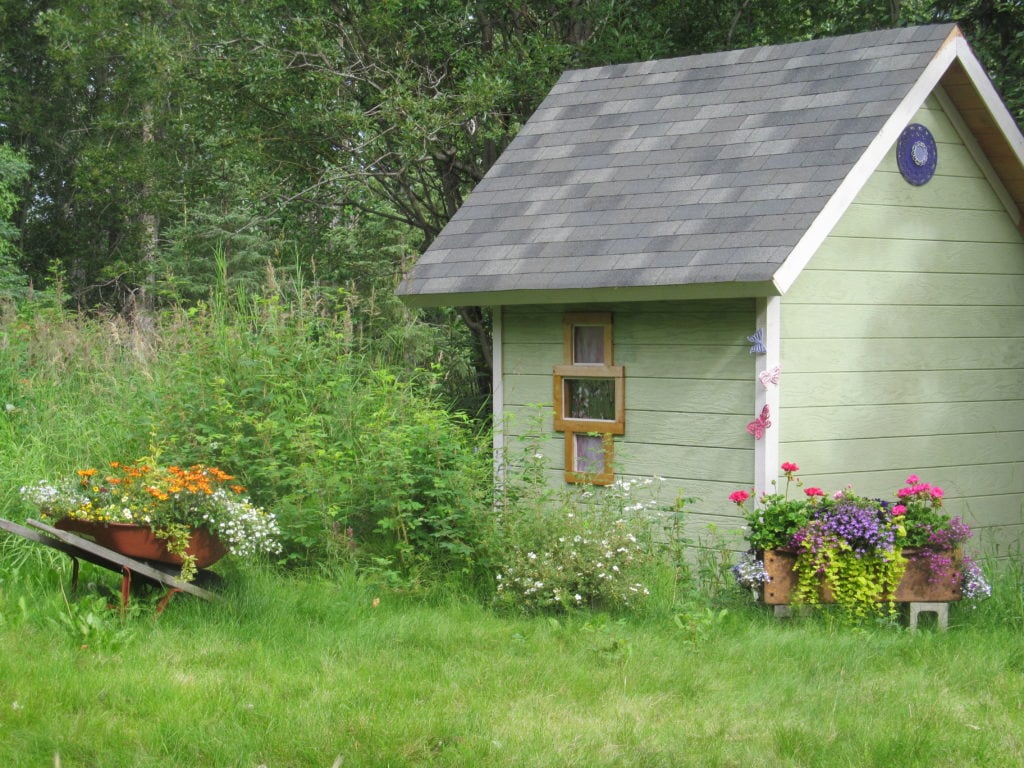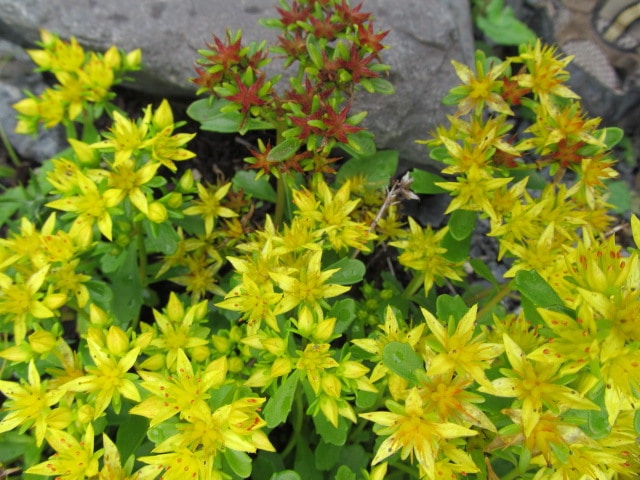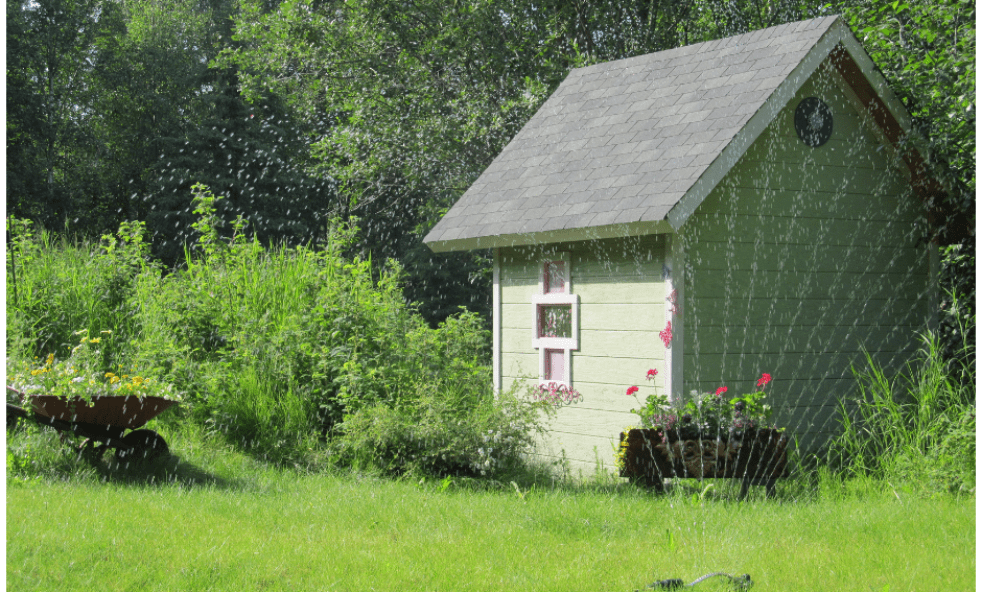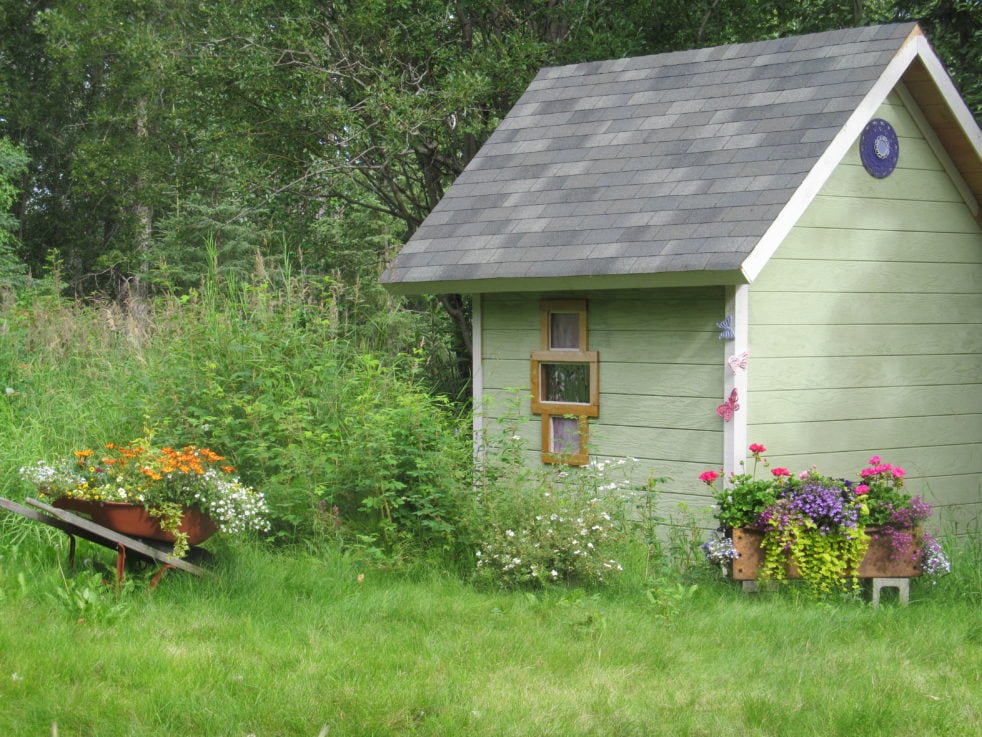
Beautiful Ground Covers: Garden Design series
When I first began to establish a garden area following the construction of my tiny home, I opted for the traditional lawn. (photo above) Which is unusual for me. I’m definitely not a “lawn” person. Believe it or not, I’ve never even owned a lawnmower! But I needed a ground cover. Something fairly cheap that would grow quickly over a good-sized strip of rocky stubble beneath the powerline that borders my front yard.
Now, a few years later, I have much more elaborate plans. While I don’t regret the lawn, I want a more natural ‘look’. One that blends better with my woodsy lot. A perfect, manicured lawn would seem out of place. So, I’m considering some of the new alternative ground covers I’ve been learning so much about. In recent years, landscape designers have started to introduce many beautiful substitutes for the traditional lawn.
Re-thinking traditional ground covers
First of all, please understand where I’m coming from. This writer is not at all opposed to lawns. It’s just that I want to do something different. (Although I am a bit of a nature girl). All controversies aside, “Make it a Garden” simply strives to advance new ideas for yard and garden design that add beauty and interest to the landscape.
However, some of the new thinking on grass lawns and lawn maintenance is also just common sense. Which is why it’s being embraced pretty much across the board. We’re re-thinking fertilizers and weed killers. In some areas of the country, residents have to comply with strict water conservation requirements.
Additionally, many people are simply looking for ground covers that promise easier, less intensive care. So, all these things have an impact. Personally, it’s my observation that all the interest in the new ground covers has more to do with the extraordinary beauty that a more naturalized look offers.
So, what are we really talking about? Certainly not major renovation. Lots of folks prefer a lawn in the backyard for kids and dogs and entertaining. On the other hand, they’re looking to jazz up the front lawn for curb appeal. Adding some unique ground covers with their various colors and textures creates a whole new look.
Exploring new ground covers
Alternative ground covers can substitute for lawn in some areas of your yard. Instead of just a flat green surface everywhere, it might be nice to look out the window and see some variety. Many groundcovers can thrive in areas of your yard where it’s difficult for grass. They provide a wide array of texture, and come in different shades of green. Some even produce a small flower with a nice fragrance.
Clover is seeing some rise in popularity among non-traditional ground covers. See my post “Clover Lawns: new ideas for ground covers”. Clover has a nice texture, and the flowers are important to bees and other pollinators. The most common variety of clover used in lawns is the “Dutch” or “New Zealand” white clover. The type that feels so soft and cushy in bare feet. Since it’s low-growing, it blends nicely with grass.
Clover adds nitrogen to the soil, reducing the need to apply fertilizer to a lawn, which is a big plus.
Moss. Most of us have been conditioned to hate moss. We work really hard to keep it out of the lawn. But allowed to grow naturally in a shady area, moss can look surprisingly nice. You don’t want it growing on your roof, but we’re talking about the yard, or at least a small corner of it.
Plant ferns there to give moss some company. Add a small rock or two, and a section of log and the result will be a naturalized corner of the yard with striking beauty. Sound intriguing? See my post on “Making Friends: the new role of Moss”
Common Perennial ground covers
If clover or moss doesn’t excite you, what about thyme? Creeping flox or Sedum? Below are several common low growing spreaders that are easy to find at most greenhouses across the country. I’ve chosen to highlight the ones suitable for colder growing zones, starting with zone 3 because that’s my neck of the woods.
But these represent only a fraction of unique and beautiful ground covers that will give your yard a whole new look. First, know your climate zone. Then, investigate the ground covers that will perform the best for your location and soil conditions.
Thymus serpyllum: Creeping Thyme “Pink Chintz”

Creeping thyme is a fragrant herb grows that grows 3-5 inches high. It does quite well in zone 3. When a breeze blows, you’ll catch a faint whiff of thyme. I have a different variety of thyme growing in my own garden and I just love it!

Ajuga, (zone 3) also known as “bugle weed”, is a matting ground cover with dark green leaves with a reddish-purplish hue. It grows 6 inches tall and produces a short blueish-purple flower stalk. Caution: this is a fast-growing spreader and has a reputation of being a ‘thug’ because it will really take over in the garden. So just be careful where you plant it.

Creeping jenny is a ‘tender’ zone 3. It’s a bright, vining plant for full sun. It’s primarily used in baskets as trailers. But it’ also a quick-to-get-established ground cover. This variety is bright green and produces small yellow flowers. Great for a sloped areas.

More hardy options
Vinca minor also known as periwinkle produces a dainty blue-ish-purple flower. It’s another vining plant that grows roots from its shoots. In some circles, its considered an “invasive” and planting it is discouraged.
However, there is a great deal of controversy in the plant world and experts don’t always agree with each other. That’s why I always recommend checking with your local plant societies or garden clubs if you’re un-sure about something.

Creeping flox is an excellent low-growing perennial for zone 3. It produces masses of bright pink flowers. (also available in white and pale blue). It’s a plant with a lot of interest and very distinguishable in the garden. I have it in my own garden (photo above). Creeping flox is slower to spread than some other ground covers. It likes full sun and is great for hills or slopes where it can cascade over an edge.

Perennial geraniums are petite little plants that produce a pale pinkish flower. It’s not really a “ground cover”. But could be planted in conjunction with ground covers. It grows in a mound and prefers more shady, cool areas.
DON’T FORGET YOUR FREEBIE! If you’re enjoying this article, why not be a part of our garden and art lovers community? Scroll down just a bit to sign up. You’ll receive “10 Artistic Ways to Make Your Yard or Garden Beautiful”, Free!

Lambs ear is so-called because the foliage resembles the shape of a lamb’s ear. It’s also soft and smooth to the touch. It’s a hardy variety for zone 3, loves full sun and thrives in poor soil. It also produces a short flower stalk.
Sedum/Stonecrop

Some varieties of Sedum / stonecrop are very hardy in zone 3 while other varieties do better in zone 4 and 5. There’s lots of variety within the Sedum family. It’s a good one for full sun. This is a readily self-seeding plant that blooms in mid-June and keeps its blooms much longer than other perennials. It produces masses of small, bright yellow flowers. I grow it in my own garden (Photo above) and it’s another favorite of mine. It’s also pest resistant and disease resistant as well.
Final Thoughts
As you can see, there are many cool options for ground covers. Lawns have a valuable purpose, too for areas that are high traffic where kids or dogs play. But for low traffic areas that don’t get a lot of use, it’s a lot of time and energy spent to maintain a lawn.
Those are perfect areas to consider for other types of ground covers. What if you could look out your kitchen window and instead of a sea of grass, it’s marbled shades of green and different textures. The sun’s shadow gives it that 3-D effect? Even specs of cheerful color as tiny flowers come into bloom.
Your yard doesn’t have to look the same year after year. By introducing one or more of these alternative ground covers, you’ll add beauty and interest. The result is less formal, more casual and relaxed where the beauty and simplicity of nature shines through. It’ll attract bees and butterflies and compliments from friends and neighbors.
For even more ideas for unique ground covers check out HGTV.
As for me, I can’t wait to see what I can do to go a little less traditional and give my yard a wild new look.
Related Posts you may enjoy
Natural Landscapes Captivate with Beauty and Interest
Alaska Wildflowers in my Garden
A Storage Shed Can Look Pretty in the Backyard
The form you have selected does not exist.


I started a planter of Lemon Balm last summer and am hoping it will come back since it’s listed as a perennial. It has a beautiful dark green hue and smells great! It’s one of those plants that can spread rapidly, so may be a good ground cover but can take over if you don’t keep track of it.
I hope it comes back for you. Lemon Balm is in the mint family. I’ve always had it in a container, like you. But I know mint can spread like crazy. Neither lemon balm or mint is typically used for a ground cover, but my mother always planted mint outside the bedroom window. With the window open during summer months, the smell of mint wafted through the room. It was quite pleasant.